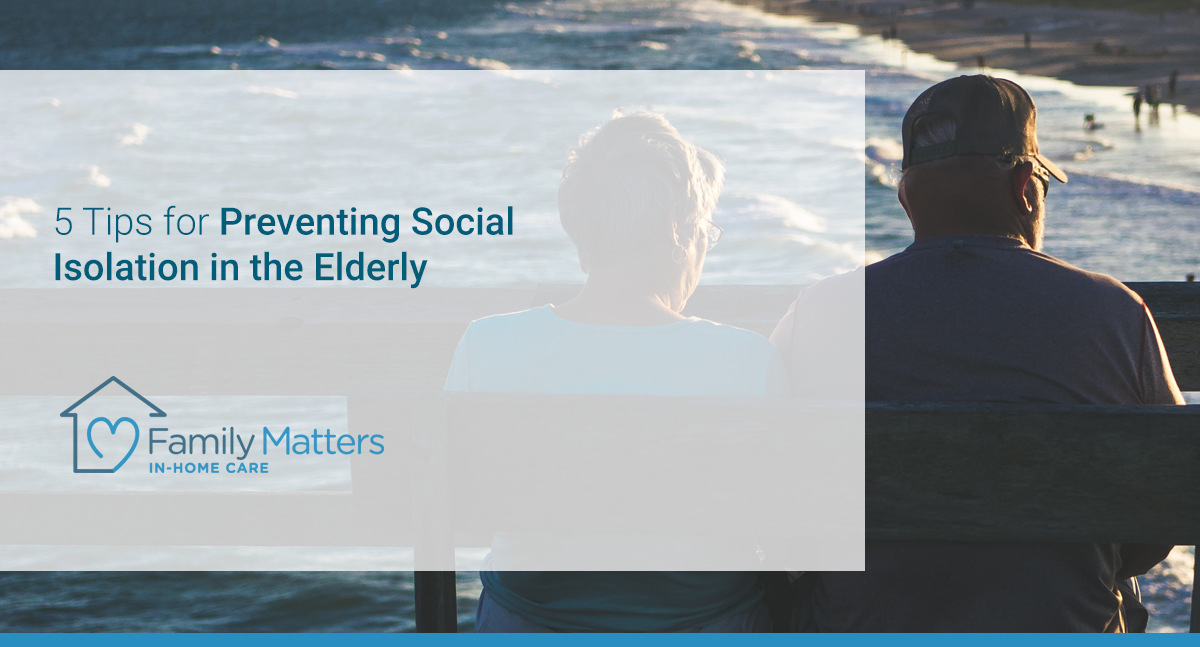
5 Tips for Preventing Social Isolation in the Elderly
Social interaction is an important part of maintaining general wellness in all stages of life, but it is especially important for seniors. As people age, they face many challenges like health decline and mobility issues that can make social interaction difficult.
Unfortunately, lack of social interaction can quickly lead to feelings of isolation, which is a growing problem among the elderly population and can cause serious negative health effects. Preventing social isolation in the elderly can sometimes take active and consistent effort on the part of the caregiver.
Here are some of the benefits of social interaction for the elderly, as well as tips for caregivers to help prevent social isolation.
Benefits of Social Interaction for Seniors
First, social interaction improves mental health. When seniors are socially engaged, they are less likely to fall victim to mental illnesses like depression.
Second, social interaction improves physical health. Studies have shown that seniors who are socially active have slower rates of cognitive decline, delayed development of chronic disease, and are more likely to lead an active lifestyle.
Finally, social interaction acts as a built-in safety net for seniors. When seniors are frequently alone, the risk of accidents and serious injuries from an accident increases. In addition, friends of seniors may pick up on slight changes in personality or behavior that can be important indicators of serious underlying health issues.
Tips to Prevent Social Isolation
Preventing social isolation in the elderly is not always easy, and the line between getting enough and too little social interaction isn’t always obvious. However, there are a few tried and true ways caregivers can significantly reduce the risk of seniors developing feelings of isolation.
Make Transportation Plans
Lack of access to transportation is a big contributing factor to feelings of isolation. Sometimes, the difference between isolation and having a healthy social life is as simple as organizing a weekly car ride or other arrangements.
Access to transportation not only opens up options for social interaction, but it also helps seniors maintain their sense of independence.
Promote Sense of Purpose
Oftentimes, seniors in retirement can struggle with finding a new sense of purpose. However, retirees with hobbies who regularly engage in activities that interest them are far less likely to experience feelings of isolation.
Some hobbies and activities are also inherently social. Joining a walking club, playing bridge, or volunteering are great ways to stay active and engage in regular social activity.
Finding a sense of purpose does not happen overnight for every senior. It may take some trial and error to see what sticks.
Encourage Attendance in Weekly Activities
Weekly activities like meetings, socials, and church can be very beneficial to seniors who need additional social interaction. These regular activities are a good way to build connections and make friends, and it provides a consistent activity to look forward to.
Even for seniors with limited mobility, attending a weekly event shouldn’t be too difficult, and it can work wonders in keeping feelings of isolation from developing.
Consider a Pet
Preventing social isolation in the elderly does not have to be limited to socializing outside the home. Studies have shown that having the responsibility of taking care of and nurturing a pet is an effective way to prevent feelings of isolation.
Seniors with pets are more likely to remain engaged with others, tend to have less depression, and experience more motivation on a day-to-day basis.
Embrace Technology
With modern technology, social interaction no longer has to be 100% in person. Technologies like video chat can enable seniors to connect with loved ones or even groups of friends without having to leave the house. It’s not uncommon for book clubs or other weekly events to take place virtually.
In addition, technology that helps seniors with things like hearing and mobility can help build confidence so that they are motivated to spend time with others. A single piece of technology can sometimes make the difference between feeling isolated and having an active social life.
Caregivers Play an Important Role
Caregivers take on a lot of responsibility, and one responsibility that can be easy to overlook is preventing social isolation in the elderly. Particularly for seniors who need a lot of day-to-day support, making sure they also attend social gatherings or spend time with friends can seem like just another thing to take on. Plus, caregivers themselves provide a familiar face, friendly conversation, and a meaningful human connection.
However, social interaction is just as important as taking medications or eating healthy, so it needs to be prioritized. With a little effort and creative thinking, you can greatly improve the senior’s social calendar and keep feelings of isolation at bay.
If you or your family member is considering in-home care as part of a plan to age in place, contact Family Matters In-Home Care today for a free consultation. Our team is dedicated to supporting your family and helping older adults enjoy life in the comfort of their own home for as long as possible.
Some of the services offered by Family Matter In-Home Care include: Alzheimer’s & Dementia Care, Bed & Wheelchair Transfer Assistance, Companionship, Housekeeping & Meal Preparation, Personal Care, Recovery Care, and Transportation.
Serving the San Francisco Bay Area and Greater San Diego, Family Matter In-Home Care has offices throughout California including: Campbell, CA, Roseville, CA, San Marcos, CA, and San Mateo, CA.
